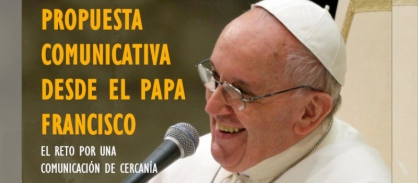An approach to the communicative proposal from Pope Francis The Challenge for a Communication of Closeness

By: José Luis Aguirre Alvis. Msc Conclusions of the work published in the following link in Spanish language *
CONCLUSION
The loving and transforming charity of Jesus' communication has a practical and concrete character in living the values of truth, justice, love and freedom. Therefore, the communication of the values of your message, as well as the
The very experience of the communicative will of the Father translated into the creation of each and every one of the men make of God's project a plan of hope based on his invitation to encounter and dialogue already initiated in the Trinity itself, granting social communication, performance of Christian communicators and the use of technological resources the mission of announcing his living presence among us.
Pope Francis contributes directly to pointing out both the basic notions for an authentically communicative experience, describes the environments that develop and nurture this capacity, especially from the nucleus of the family, as well as recommends the direction of the professional performance of communicators at the same time their understanding and management of both traditional and new generation technological resources at their fingertips.
Thus, it can be concluded, and from a conceptual synthesis of his Messages addressed to the World Day of Social Communications four axes that can represent his character as Pastor and communicator. Their constants on the experience of communication are grouped in this way in four dimensions:
1. Understand human communication;
2. Understand the gift of the word;
3. Understand the new scenarios of the word, and; 4. Communication as a promise and announcement:
UNDERSTAND HUMAN COMMUNICATION
Communication allows us to get to know each other better and to be united.
Communication overcomes divisions if we are willing to listen. Listening allows us to learn from others.
Communication as dialogue allows to grow in understanding and respect for others.
Communication is patient welcome and listens to others.
The communication that is listening allows to see with the eyes different from the other.
The communication of encounter is understood in terms of proximity, but not only to recognize the other as similar but to make ourselves similar to him.
Communication as dialogue is intertwined with the language of the body.
Communication is possible because we can give because we have received.
Communication as a discovery and construction of proximity is the ability to embrace, hold, accompany each other, decipher the looks and silences, laugh and cry together Communication is also expressing compassion, tenderness and forgiveness.
Communication has the power to create bridges and to favor encounter and inclusion.
Communication is also mercy when looking for new ways of speaking and dialoguing.
The communication of encounter makes choosing words and gestures carefully because it aims to build peace
UNDERSTAND THE GIFT OF THE WORD
Whoever communicates becomes a neighbor, becomes close.
Communicating means sharing, and to share you need to listen, to welcome.
Listening allows us to assume the right attitude towards the other.
Communication is not a presumption of omnipotence but a gift of service to the common good.
Silence is an integral part of communication.
Exulting joy for the joy of the meeting is the greatest moment of the communication experience and refers us to the creative joy that we carry even before coming into the world.
The family is the first place where we learn to communicate.
The family is where you learn to live together in difference and the wider this range is, the richer the environment of life in respect and forgiveness.
Forgiveness is a dynamic of communication because it seeks to rebuild and increase it.
The family is where one learns an essential form of communication which is prayer.
Communicating in an inclusive way is welcoming without letting anyone be excluded.
Today's challenge is to learn to narrate, retell and listen to the narratives of others, and there will be no narration that does not have value and importance.
UNDERSTANDING THE NEW SCENARIOS OF THE WORD
The means and networks of human communication are a gift from God. To open the doors to the digital world is to cross the threshold of the temple and go out to meet it, putting yourself in everyone's way. The world of digital communications can help us grow or become disoriented. Digital connections can end up isolating us from our neighbors. Those who cannot access these media can be excluded. Digital media are inalienable, but they can also hinder the meeting, their use depends on being oriented to a proposal to establish contact, share and continue building the relationship, not evasion It is not the technology that determines whether the communication is authentic or not, but the heart of man and his ability to use well the means at his disposal. The network we want is the one that opens the way to dialogue, to meeting, to smiling, to caressing.
COMMUNICATION AS A PROMISE AND ANNOUNCEMENT
Communicating the Good News is par excellence the communicative work of Christians.
The Good News is announcing Jesus himself.
It is in Christ that the voice of humanity rises up to Heaven, and we can be communicating witnesses of a new humanity, redeemed to live in communion.
We have the ability to weave, and weave narratives, texts, that bring us closer and let us know about each other. And Holy Scripture is a History of Stories.
To tell the Lord is to enter into his gaze of compassionate love towards us.
The human being, being created in the image and likeness of God, can only express and share the truth, the good and the beauty that precedes his own existence.
Communicate the truth is to reveal reality, seek relationship and free yourself from falsehood.
God is not loneliness, but communion; It is love, and therefore communication, because love always communicates, indeed, it communicates itself to find the other.
Christians are called to manifest this communion because it is by the impulse of God's love that we can communicate, welcome, understand and correspond to the gift of the other.
* DIRECTOR OF SECRAD (RADIO AND TELEVISION TRAINING SERVICE FOR DEVELOPMENT) - UNIVERSIDAD CATÓLICA BOLIVIANA "SAN PABLO" REGIONAL ACADEMIC UNIT - LA PAZ







